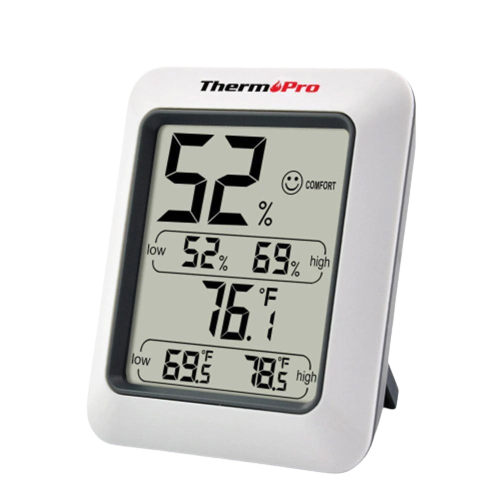My Cart
Your cart is empty
Congrats!
You've qualified for free shipping!
Nearly there!
Your cart is empty
Congrats!
You've qualified for free shipping!
Nearly there!
If you are having trouble getting to sleep, a humidifier may just be the solution. A Humidifier can help congested adults, babies or children having problems breathing.
We stock two types of Humidifier:

|
When humidity is low you may find you become dehydrated (as a result of supplying moisture to the air), have a runny nose, difficulty breathing, chapped skin, sore and dry throat and eyes, and fatigue. A Humidifier will increase the humidity(moisture) in a room, home, or office - which can help people with breathing, nasal congestion, sinus and respiratory problems.
In winter many people find that heating dries out the air - a humidifier may just be the solution.
Using a Humidifier or a Dehumidifier you aim for optimal humidity levels of between 40% to 60%. Check out our range of whisper quiet humidifiers and get a good night's sleep!
We provide fast delivery of our humidifiers Australia wide including: Melbourne, Sydney, Central Coast, Brisbane, Gold Coast, Cairns, Perth, Adelaide, Canberra, and Hobart as well as all other metro and urban areas.
| We stock the Ionmax range of Humidifiers - Quality and Innovation |
Sleep Solutions is NDIS Registered and Approved
A humidifier is a device that adds moisture to the air to prevent dryness that can cause irritation in many parts of the body. Humidifiers are particularly effective for treating dry skin, nose, throat, and lips. They can also ease some of the symptoms caused by the flu or common cold. The basic principle behind a humidifier is to release water vapour or steam into the air to increase humidity levels. There are several types of humidifiers, including evaporative, ultrasonic, and steam vaporizers. Evaporative humidifiers use a fan to blow air through a wet wick, filter, or belt. As the air passes through the wet material, it evaporates the water into the air. Ultrasonic humidifiers use a metal diaphragm vibrating at an ultrasonic frequency, similar to the workings of a speaker, to create water droplets that are then expelled into the air.
Steam vaporizers heat water to create steam, which is cooled slightly before leaving the machine and entering the room's air. While humidifiers are beneficial, it's important to use them correctly. Overuse can lead to high humidity levels, which can promote the growth of mould, bacteria, and dust mites. It's recommended to maintain indoor humidity levels between 30% and 50%. To ensure the air stays healthy, it's also crucial to regularly clean the humidifier according to the manufacturer's instructions to prevent the growth of microbes within the device itself. For optimal use, consider the size of the area you want to humidify and select a humidifier that matches the space requirements.
Using a humidifier can be beneficial in several situations, primarily aimed at improving air quality and comfort in your indoor environment. You might consider using a humidifier in the following scenarios:
It's important to use a humidifier correctly to avoid the negative effects of too much humidity, such as mould growth and an increase in dust mites and allergens. Monitoring humidity levels with a hygrometer can help ensure they stay within the recommended range of 30% to 50%. Regular cleaning and maintenance of the humidifier are also crucial to prevent the buildup of bacteria and mould inside the device, which could be dispersed into the air. By understanding when and how to use a humidifier effectively, you can improve the air quality in your home, benefiting your health and the longevity of your belongings.
Choosing the right size humidifier for your space is crucial for optimal performance and efficiency. The size of the humidifier you need depends on the area you wish to humidify, measured in square metres. Humidifiers are typically categorised by the size of the area they can effectively cover, ranging from small, personal models designed for individual rooms to large units capable of adding moisture to the entire house. Here's a general guideline:
When selecting a humidifier, consider the ceiling height as well; higher ceilings mean more air to humidify, which may require a larger capacity unit. Additionally, take into account the typical humidity level of your environment and the level of insulation in your home. Poorly insulated homes in dry climates may need a more powerful humidifier. It's also important to look at the humidifier's output, measured in litres per day, to ensure it can adequately maintain the desired humidity level in your space. By considering these factors, you can select a humidifier that meets your needs, providing the right balance of moisture for comfort and health benefits.
A dehumidifier and a humidifier are both household appliances designed to regulate the humidity levels within a space, but they serve opposite functions. Understanding the difference between the two is essential for ensuring a comfortable and healthy living environment, especially in regions with extreme moisture levels or during certain seasons.
Here's a breakdown of their primary differences:
When deciding between a dehumidifier and a humidifier, it's crucial to assess the needs of your living environment. Monitoring the humidity levels and understanding the benefits of each appliance will guide you in making an informed decision for the health and comfort of your home's occupants.